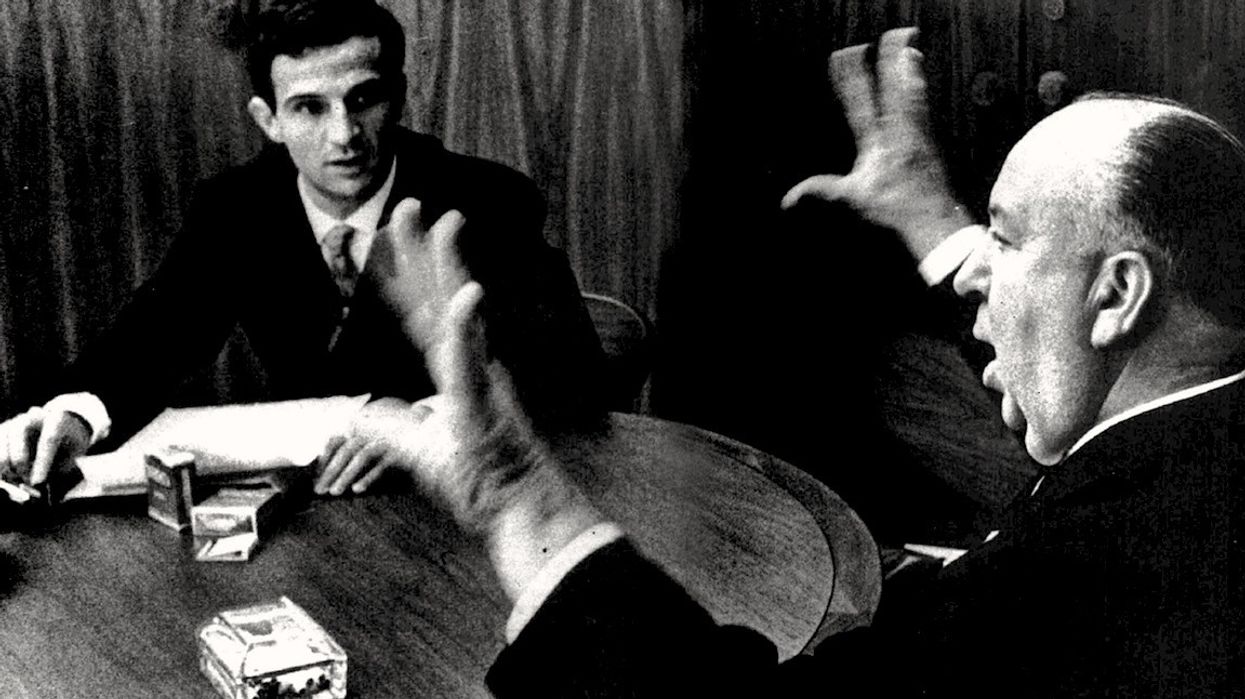Listen to 12 Hours of François Truffaut Interviewing Alfred Hitchcock for Free

In 1962, French filmmaker, critic, and so-called "Father of the New Wave," François Truffaut, carried out a series of interviews with Alfred Hitchcock at the latter's Universal Studios' office. At the time, The Birds was in post-production, and Truffaut, who had kick-started the French New Wave movement with his debut feature The 400 Blows, had just directed his third film, Jules et Jim. A key founder and proponent of the so-called auteur theory, which stated, very roughly, that the best films could be viewed as the work of one sensibility, Truffaut saw Hitchcock as a prime example of this theory in action. Their approximately 12 hours of discussions served as the basis of his influential study of the director, Hitchcock. Now you can listen to their conversations for free online, as well as peruse the book, with its hundreds of amazing stills and transcripts of their discussions.
The interviews which Truffaut conducted focused on Hitchcock's life and career up to that point, though since he did not speak a great deal of English, Truffaut enlisted the help of Helen Scott from the French Film Office, who acted as a translator. Here's a playlist of the interviews, courtesy of the Internet Archive, which also has a guide to all the files and links where they can be downloaded individually:
As a critic, Truffaut, through his work at the influential French journal Cahiers du Cinéma (where his brutal reviews had earned him the nickname The Gravedigger of French Cinema), had been instrumental, starting with his 1954 essay, "A Certain Tendency of the French Cinema," in devising what later came to be known as the auteur theory, a divisive and controversial term which has been the subject of endless critical back-and-forth. It is far beyond this post's purview to get into the niceties (and not-so-niceties) of this theory, though for our purposes a definition could be:
A director can use the commercial apparatus of filmmaking in the same way that a writer uses a pen or a painter uses paint and a paintbrush. It is a medium for the personal artistic expression of the director. The film theoretician, André Bazin, explained that: auteur theory was a way of choosing the personal factor in artistic creation as a standard of reference, and then assuming that it continues and even progresses from one film to the next.
Auteur theory praised directors like Jean Renoir, Orson Welles, Hitchcock, and John Ford, and the French New Wave arose partly out of these Gallic directors applying these ideas in their own films. Truffaut himself claimed to have been inspired to make his debut feature, The 400 Blows, by American filmmaker Morris Engel and his 1953 independent, low-budget film Little Fugitive, saying, “Our New Wave would never have come into being if it hadn’t been for the young American Morris Engel, who showed us the way to independent production with [this] fine movie."
Hitchcock was a chief example held up by proponents of the auteur theory because his films have a striking unity in their use of montage, mise-en-scène, thematic concerns, and the discussions he had with Truffaut are a real treasure for any cinephile. Here they are, discussing Psycho:
François Truffaut: Would you say that Psycho is an experimental film?
Alfred Hitchcock: Possibly. My main satisfaction is that film had an effect on the audiences, and I consider that important...I feel it's tremendously for us to be able to use the cinematic art to achieve something of a mass emotion. And with Psycho we most definitely achieved this. It wasn't a message the stirred the audiences, nor was it a great performance or their enjoyment of the novel. They were aroused by pure film.
Portions of the book that would later come from their conversations are also available as a preview from Scribd:
Links:
- "A Certain Tendency of the French Cinema" by Francois Truffaut-New Wave Film
- Alfred Hitchcock long interview - with François Truffraut -- The Internet Archive
- The Definitive Study of Alfred Hitchcock by François Truffaut











